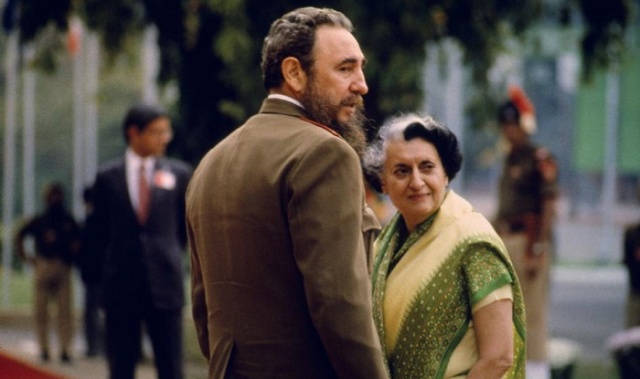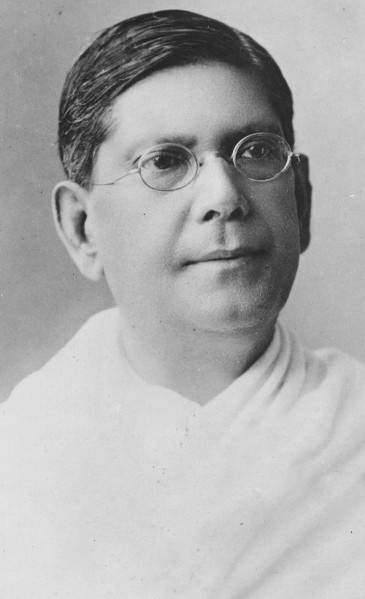
Fidel Castro and Indira Gandhi. Image Source: India.com

Fidel Castro and Indira Gandhi. Image Source: India.com

Portrait of Deshbondhu. Image Source: Wikimedia Commons
Like Burke, and the liberals I mentioned in the Ancient Constitution post, Deshbondhu believed that rule of law had to be subservient to some other concept of law (shall we call it natural law?) in order to justify obedience:
Why are the Indian Criminal Law Amendment Act 1908 and the Prevention of Seditious Meetings Act 1911 to be retained on the Statute Book? For the preservation of law and order? They little think these learned gentlemen responsible for the report that these Statutes, giving as they do to the Executive wide, arbitrary and discretionary powers of constraint, constitute a state of things wherein it is the duty of every individual to resist and to defy the tyranny of such lawless laws. These Statutes in themselves constitute a breach of law and order, for, law and order is the result of the rule of law; and where you deny the existence of the rule of law, you cannot turn round and say it is your duty as law-abiding citizens to obey the law.
p. 14

Image Source: Quartz India
This recent spate of “right wing” victories which includes Brexit, Trump, and the European nationalists is part of the same global phenomenon which produced Modi.
It almost seems too obvious to point out how similar Trump and Modi are but I haven’t seen many people in my circles saying it. Probably because I hang out mostly with Americanized NRI liberals in the Brahmin class (as per Moldbug’s schema, not Chaturvarna). These people love Modi and hate Trump and want to avoid finding the obvious similarities and connections. There are some articles tracing out the connections. Mostly in condemnatory tones. But some sources are saying the exact opposite as well, which is totally ridiculous. So lets go over some of the basics.
Victory of the Edgelords: The first major similarity is their negative public branding, and the material causes for why that sort of branding was possible in the first place. Trump and Modi both are both considered bigots by their liberal opponents (particularly in English language media which has been totally captured by leftist establishment forces), and have garnered support from right wing radicals. In Trump’s case this mostly centers around his rhetoric, though he is also favored by far right groups like (numerically and politically insignificant) KKK or the (much more numerous and significant) Alt-Right. In Modi’s case it derives from his institutional connection with the RSS and Hindutvadis in general, and his role in the Gujarat riots. In both cases this seemed to have damaged their reputations and election chances at the time. They were considered outsiders with hickish attitudes by their own liberal countrymen, and scary nationalists by neoliberals in other countries. Remember how under Obama the US denied Modi’s visa? Well Trump narrowly escaped the same fate at the hands of the UK parliament. Ultimately in both cases this politically correct negative branding failed to stop the candidate, as what the media establishment portrayed as a negative and bigoted campaign was interpreted very differently by the voting public.
Did India have an Ancient Constitution worth respecting, or not? Did the British uphold it, or destroy it? For a Libertarian or Burkean Conservative Hindu, these are important questions to consider dispassionately. The answer actually matters. If India had an Ancient Constitution which was destroyed when the British came, then much of India’s existing constitution, a combination of British laws and the arbitrarily imposed theories of Ambedkar, is an usurpation of the ancient rights and privileges primordial to the land and the race. The very basis of the Indian state is in question in this case. On the other hand, if India had no such Ancient Constitution, or if it was destroyed by the Mughals and restored by the British, then the period of British rule was a period of liberation from Oriental Despotism wherein India was Brought Into History as Hegel might have said. This is a somewhat false binary, but I present it anyway to show some of the dramatic potential conclusions we can come to.
Its also important to consider what such a concept as an Ancient Constitution really even means. Is it a principle of abstract justice which is universal? Or do different societies create internally valid social compacts which might differ from one another in legitimate ways? Or is this an incorrect way of framing the question?
I’m not really going to try to definitively settle the historical question in this post. I’m still doing research on the topic and will put out my full view on it later if I think I gain enough information to make such a judgement. I’ll instead just briefly discuss what the idea of an Ancient Constitution meant to a few thinkers in the context of India. I’ll look at Bose, Burke, Roy, and Naoroji.

Portrait of Subhash Chandra Bose. Image source: quotesgram.com
Bose: